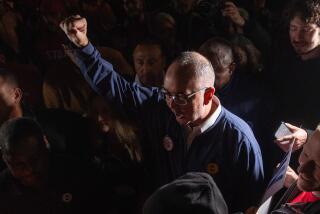Unity Taking Its Toll on Germany : Economy: Recession fears grow as unions prepare for key wage talks.
- Share via
FRANKFURT, Germany — Nearly 18 months after achieving their dream of unification, the Germans face a series of economic problems that look more like a nightmare than the results of a wish come true.
While experts remain convinced that unity and the collapse of communism in Europe will eventually increase Germany’s economic might, the Continent’s industrial giant is suffering a collection of interim ills.
In the last year, Germany has watched its trade surplus shrink by 80%, its balance of payments slide into the red for the first time in a decade, interest rates go higher than anytime since World War II, inflation creep to an unusually high 4% and its economy wobble on the brink of recession.
But what has economic planners far more worried than these unpleasant developments is a crucial round of wage talks that threaten unaccustomed industrial disruption in the short run and the strength of the country’s industrial base in the longer term.
The steel industry only narrowly avoided a stoppage in January, while bank employees--in pursuit of a 10.5% wage hike--have staged a series of warning strikes for the first time in the post-World War II era.
Unions and management in other key branches of the German economy have rarely begun their annual talks from starting points so far apart.
Pointing to increased inflation and higher taxes imposed to finance unity, Germany’s labor unions say they need big wage increases to compensate for diminished spending power. They insist that Germany is rich enough to pay them.
Conversely, employers cite statistics showing that Germany already has the industrialized world’s highest hourly wage costs. Large settlements, they say, would endanger German competitiveness and drive jobs out of the country.
Chancellor Helmut Kohl and his economic advisers argue that hefty increases could tip Germany into recession and cut the flow of capital investment so badly needed to bring the former communist east back onto its feet.
His government has condemned the demands of some large unions, characterizing any settlement of more than the 4% inflation rate as irresponsible.
Undaunted, the 2.1-million-strong public servants’ union says it is prepared to strike for a one-year, 9.5% wage increase. The country’s largest industrial union, with a membership of 3.6 million metal workers, has begun a campaign for a similar hike.
Eastern members of Parliament, whose constituents earn from one-half to two-thirds as much as western Germans in the same jobs, see the demands--all formulated by the large western unions--as symptomatic of western greed.
“Demands of 10% aren’t exactly tailored to foster east-west integration,” said Erhard Mueller, a member of the eastern-based Alliance ’90 executive committee.
Although union leaders complain that they have never experienced such intense, widespread resistance to their claims, there are few signs that they plan to cave in.
While the public servants’ union quickly chopped 2% off its initial 11.5% claim, its leaders are holding to a revised demand--still nearly triple the government offer of 3.5%.
The steel industry’s settlement, which included a 6.4% wage hike, has been viewed by economists as a bad sign. “It’s much too high,” said Peter Pietsch, an economist at the Commerzbank headquarters here. “This is not in line with the economic situation and productivity conditions.”
Pietch and others worry that the steel industry agreement could become a dangerous guideline for other industries where management, eager to avoid stoppages at times of full production, agrees to pay more in order to preserve short-term gains.
Norbert Walter, respected chief economist at the Deutsche Bank, predicts that wage accords this year will likely run between 5.5% and 6.5%.
“We’re not going to fall apart with settlements of this size, but it spoils any chance of solid growth,” he said. “With the effects of immigration and unification, we would have had an annual growth rate of 4% over the next four years without really trying. Now that won’t happen.”
More to Read
Sign up for Essential California
The most important California stories and recommendations in your inbox every morning.
You may occasionally receive promotional content from the Los Angeles Times.













